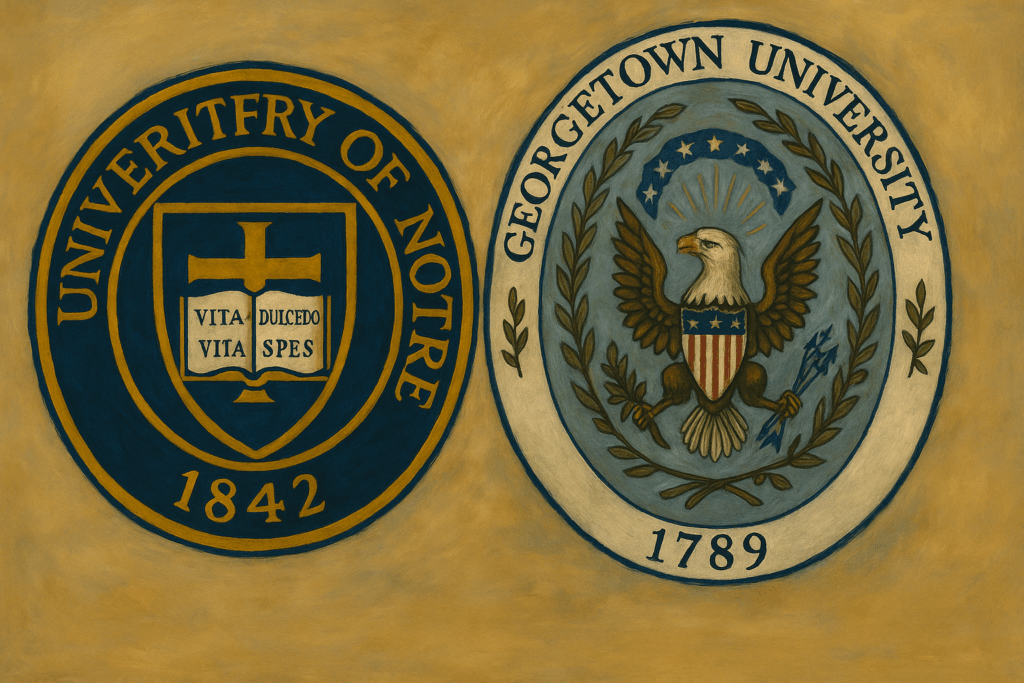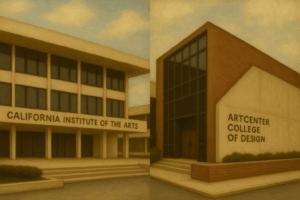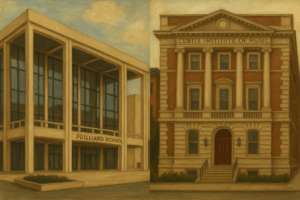
The GOAT of American Catholic Universities?
When discussing the pinnacle of American higher education, the University of Notre Dame and Georgetown University signify more than just top-tier institutions. As America’s preeminent Catholic universities, they share a common mission to pursue both intellectual cultivation and personal character growth.
However, in their journey toward this goal, they have developed starkly different philosophies and cultures. One has built a bastion of faith and scholarship based on a strong community spirit in the heart of the American Midwest. The other, grounded in the Jesuit spirit in the nation’s capital, has become an intellectual crossroads open to the world.
This article, based on the latest 2025 information, aims to provide an in-depth analysis of the essential ‘soul’ of these two universities, moving beyond simple numerical comparisons. By closely examining everything from university rankings to history and culture, unique residential systems, and alumni networks, we hope to help future leaders find not just the ‘better’ university, but the university that is a ‘better fit for me.’
Chapter 1. The Stage of Prestige: An In-Depth Analysis of 2025 University Rankings
University rankings are a crucial clue that reveals the values and strengths each university pursues. Let’s explore how Notre Dame and Georgetown have built their top-tier reputations in different domains through the latest 2025 rankings.
| Ranking Body & Year | Category | University of Notre Dame | Georgetown University |
|---|---|---|---|
| U.S. News & World Report | 2025 National Universities | 18th | 24th |
| QS World University Rankings | 2025 World Universities | 316th | 301st |
| Times Higher Education | 2025 World Universities | 196th | 201-250th |
| QS World Rankings by Subject | 2025 Theology, Divinity & Religious Studies | 1st | Not Ranked |
| Foreign Policy Magazine | 2024 Master’s Programs for International Relations | Not Ranked | 1st |
📈 Overall Rankings: National Prestige vs. International Standing
In the U.S. News National Universities ranking, Notre Dame (18th) outpaces Georgetown (24th), demonstrating its strong domestic brand power. This reflects the strength of its robust undergraduate-focused education and its powerful nationwide alumni network.
On the other hand, global university rankings like QS and THE show that both universities have a similar level of international influence.
⚔️ Strengths by Major: A Tell-Tale Sign of University Identity
The true difference between the two universities is starkly revealed in their rankings by subject.
- Georgetown: The Political and Diplomatic Hub of Washington D.C.
Georgetown’s identity is summarized by its overwhelming prestige in the fields of international relations and political science. It is no coincidence that the renowned journal Foreign Policy ranked Georgetown’s Master’s program in International Relations as #1 in the world. This is the inevitable result of the Jesuit spirit, which emphasizes a ‘life for others,’ combined with the geographical advantage of being in the U.S. capital, Washington D.C. - Notre Dame: The Intellectual Heart of Theology and Ethics
Notre Dame’s strength is deeply connected to its religious roots. Its #1 world ranking in Theology, Divinity & Religious Studies by QS symbolically shows that Notre Dame is a global center of Catholic intellect. This academic excellence permeates the intellectual journey of all its students, creating an educational environment that forces them to confront fundamental questions about humanity and society.
In conclusion, the choice between the two universities is not simply a comparison of numbers on a ranking table, but a decision about which of two distinct worldviews and intellectual traditions to join.
Chapter 2. Beliefs Etched in History, Cultures Defined by Faith
If a university’s ranking is its current status, its history explains its ‘soul.’
☘️ The Spirit of Notre Dame: Faith, Fortitude, and Community
In 1842, French priest Father Edward Sorin founded a beacon of Catholic intellect in the desolate lands of Indiana. When a great fire turned everything to ashes in 1879, he declared, “We will build it bigger and better,” and immediately began reconstruction. This anecdote symbolizes the indomitable spirit of Notre Dame today—the ‘Fighting Irish.’
This history has created a culture that can be summed up in one word: ‘community.’ The Golden Dome and the Basilica of the Sacred Heart at the center of campus serve as a focal point where faith and scholarship become one. Here, students grow as members of the ‘Notre Dame Family,’ based on a tight-knit sense of belonging.
🏛️ Georgetown’s Mission: The Jesuit Ideal in the Nation’s Capital
In 1789, John Carroll, the first Catholic bishop in the United States, founded a university in the capital of the fledgling republic. This meant that Georgetown was destined from its inception to be deeply connected with the nation’s political and intellectual life. Georgetown’s culture is deeply rooted in the educational philosophy of the Jesuits.
- Cura Personalis (Care for the entire person): A holistic education that cares for the intellectual, ethical, and spiritual growth of each and every student.
- People for Others: The calling to use one’s knowledge and abilities to contribute to social justice and the common good.
- Academic Excellence and Interreligious Understanding: An open community that respects diverse beliefs alongside rigorous inquiry.
🌐 Analysis: Community-Centric vs. World-Centric
The cultures of the two universities show a fundamental difference.
- Notre Dame: Is essentially community-centric. The student experience is perfected within a tight-knit, traditional community that fosters strong internal cohesion and identity, separate from the outside world.
- Georgetown: Is fundamentally world-centric. The Jesuit mission and its location in Washington D.C. lead students to engage with global issues beyond the campus walls. Internships on Capitol Hill and events at embassies become extensions of classroom learning.
Chapter 3. A Home on Campus: Two Visions of Residential Life
The space where a university’s philosophy is most concretely implemented is its residence halls.
👨👩👧👦 Notre Dame’s Residence Halls: A ‘Family’ for Life
Notre Dame’s residential system is very unique. Most students live in the same single-sex Residence Hall they are assigned to upon admission until graduation.
- Independent Communities: Each of the 32 halls functions like a ‘family,’ with its own name, mascot, traditions, and chapel.
- Strong Sense of Belonging: Students feel a strong sense of pride in their hall and form lifelong bonds through inter-hall sports and signature events.
- Mentor System: A Rector, who is a priest or staff member, and upperclassmen serve as mentors, looking after the students.
🤝 Georgetown’s Living-Learning Communities: A ‘Team’ United by Passion
Georgetown operates Living Learning Communities (LLCs), where students with common interests live and learn together.
- Theme-Based: They are organized around various themes such as ‘Justice and Diversity’ or ‘Entrepreneurship.’
- Intellectual Growth: They extend classroom discussions into the residence hall, combining academic inquiry with social interaction.
- Faculty Interaction: A Faculty-in-Residence is assigned to live with the students, dining and discussing with them to form deep relationships.
Which Community Do You Want?
Do you want to find a ‘family’ for life, or do you want to be part of a ‘team’ that unites for a common goal? The answer to this question will be the key to finding the right university for you.
Chapter 4. The Legacy of Leaders: An In-Depth Analysis of Alumni Networks
A university’s true value is proven by the impact its graduates have on society. Let’s take a concrete look at what kind of leaders each university has produced.
Georgetown: Rulers of Public Service and the International Stage
Georgetown’s alumni network clearly shows how the slogan ‘People for Others’ is realized. The influence of Georgetown graduates, especially in public service fields like politics, diplomacy, law, and international organizations, is so powerful that it has spawned the term ‘Georgetown Mafia.’
- Politics, Diplomacy, & Law
- Bill Clinton: 42nd President of the United States
- Felipe VI: Current King of Spain
- King Abdullah II: Current King of Jordan
- Gloria Macapagal Arroyo: Former President of the Philippines
- George Tenet: Former Director of the CIA
- Richard Durbin: Current U.S. Senate Majority Whip
- Antonin Scalia: Former U.S. Supreme Court Justice
- Culture & Media
- Bradley Cooper: Actor and Director
- Maria Shriver: Journalist and former First Lady of California
- Nick Kroll: Actor and Comedian
Analysis: A Dense ‘Capital Network’
The world-class reputation of the Walsh School of Foreign Service (SFS) and the geographical advantage of being in Washington D.C. provide students with opportunities to build practical careers through internships at the White House, the State Department, and the World Bank from their undergraduate years. After graduation, they form a powerful D.C.-centric human network that helps guide one another. If you dream of a career in international politics or the public sector, Georgetown’s alumni network is an unparalleled asset.
Notre Dame: Influence Across the Breadth of American Society
Notre Dame’s alumni are characterized by exercising leadership in various core areas of American society, rather than being concentrated in a specific field. This reflects the university’s educational philosophy, which emphasizes a broad liberal arts education and ethical values.
- Politics & Law
- Condoleezza Rice: 66th U.S. Secretary of State
- Amy Coney Barrett: Current U.S. Supreme Court Justice
- Joe Donnelly: Current U.S. Ambassador to the Holy See, former Senator
- Business & Economics
- Brian Moynihan: CEO of Bank of America (BoA)
- Edward J. DeBartolo Jr.: Former owner of the San Francisco 49ers, real estate tycoon
- Phil Schiller: Former Apple Senior Vice President of Worldwide Marketing
- Academia & Science
- Eric F. Wieschaus: 1995 Nobel laureate in Physiology or Medicine
- Culture & Sports
- Nicholas Sparks: Author of the novel The Notebook
- Regis Philbin: Legendary talk show host
- Joe Montana: Legendary NFL quarterback
Analysis: A Loyal ‘Nationwide Network’
Although Notre Dame’s alumni network is geographically and professionally dispersed, it is tightly bound by the unique, intense community experience of the ‘Notre Dame Family’ and a deep loyalty to their alma mater. ‘Domers’ (a nickname for Notre Dame graduates) are famous for willingly helping each other out anywhere in the U.S., whether on Wall Street in New York, in the legal circles of Chicago, or at tech companies in Silicon Valley. This opens a wider door of opportunity for students who want to explore various possibilities rather than being limited to a specific field.
Conclusion: Finding Your Path – The Heartland Scholar or The Global Citizen?
After tracing the journeys of Notre Dame and Georgetown, we realize that debating which one is superior is meaningless. The core of the choice lies in which university’s philosophy resonates more deeply with your own ideals.
Summary of Key Differences
| Notre Dame | Georgetown | |
|---|---|---|
| Academic Identity | Theology / Ethics | International Politics / Public Policy |
| Cultural Ethos | Community-centric | World-centric |
| Student Experience | Campus-immersive | City-extended |
| Alumni Network | Nationwide network | Capital-centric network |
Ultimately, the two universities present different ideal student archetypes.
- 🧑🏫 ‘The Heartland Scholar’ These individuals cultivate deep intellect and character within Notre Dame’s tight-knit, value-centric community. After building inner strength amidst a strong sense of belonging and tradition, they go out into the world to exercise leadership in their respective fields.
- #### 👨💼 ‘The Global Citizen’
These individuals engage directly with the world from the moment they begin their academic journey at the intellectual crossroads that is Georgetown. They translate theory into practice in the living laboratory of the nation’s capital and seek solutions to global problems.
Ultimately, the choice between Notre Dame and Georgetown requires deep self-reflection. Do you want to establish your identity within a solid community, or do you want to constantly test and grow yourself at the center of the world?
May this guide serve as a meaningful milestone in confidently choosing your own path.


